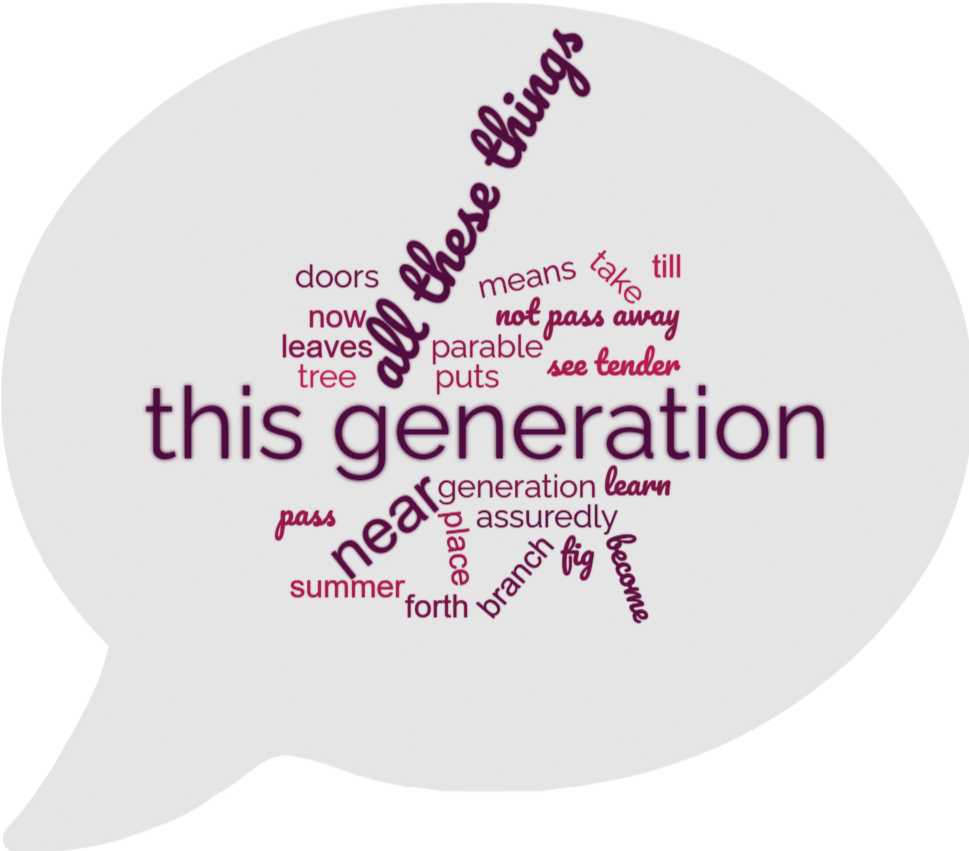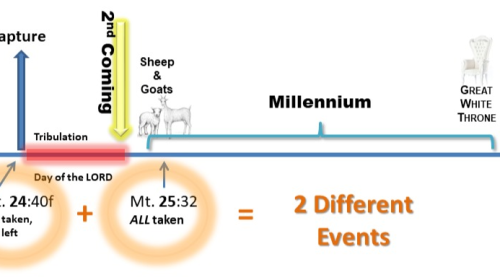
“This Generation” is not about “who”

I WAS just asked this question concerning Matthew 24 and the Olivet Discourse:
“Dave Reynolds, my apologies for misunderstanding you. How do you know from the passage or from other Scripture that it’s future oriented? Near future? Distant future? Other?”
My response:
I know it is Future because this disciples asked, ““Tell us, when will these things be? And what will be the sign of Your coming, and of the end of the age?” ,It is about The End, and all the stuff Jesus told them in the passage would happen. If it is not about The End and the sign of the 2nd Coming, then Jesus did not answer their question.
As an aside, In Matthew 24:34 Jesus said that “This generation shall not pass till all these things be fulfilled,” speaking about all those things he had been saying. The word “generation” is from the Koine Greek, ‘genea‘ and it means a generation; by implication an age (the period or the persons: – age, generation, nation, time). Remember, the disciples did not ask Jesus “who” this was going to happen to. They asked him “when” and about “the end of the age.” Context is with respect to time.
Now some will pick and choose and say it means a specific nation and people. I do not even have a problem with ‘genea‘ or “generation” as a translation meaning a particular people, but if you are going to translate it that way, you had better not ignore the context as that of Jesus answering the disciple’s questions concerning, “When!” So to say that only a race is what it means exposes an agenda and is a tad bit dishonest as, we just saw, it can as well refer to an age or time, and either way is isolating the word in an entire context of meaning. Say it means a race if you will, but do not leave out the “time” references as Jesus answers their question of “when” will these things take place.
Even if a specific people (the Jews)
The Greek word ‘genea‘ is translated generation 37 times, “time” twice, “age” twice, and “nation” only once. No specific nation or people are named in the passage, although several events and the people observing them are. Despite this fact folks will say Matthew is all about Israel so this is about Israel will not pass before everything is fulfilled, I say two things: One, is, “ya think!” I mean, of course Israel will still be here as God promised, but, Two, If Matthew is all and only about Israel then explain to me why it is the only gospel that mentions “church?”
Context, in particular immediate context, verse 32 mentions how you know a particular time of the year has arrived; summer! Then in verse 33 Jesus says, “so likewise” indicating he is talking about a segment of time. He is not talking about a people or nation because he says “when you see all these things, know that it is near, at the doors.” Are a people an “it” or are they a “they?” The very verse in question uses the word “till” or “until” indicating time, “till all these things be fulfilled.” Easy, right? Unless one has an agenda to paint a different picture.
But Just supposing
Okay. I’ll bite. I like the Process Of Elimination.
Then if the proclamation is logically about Israel, the Jews, then “Houston, we have a problem” as the iconic Apollo 13 quote goes, because of that word “till” or “until” depending upon the translation. That would mean that once all these things take place, then Israel or the Jews will pass away. “This generation will by no means pass away till all these things take place.” ,So, if by “this generation” you mean a people, then what happens to God’s eternal promises to Israel if Jesus was saying in this passage that once all these things take place, this generation will “pass away?”
Context determines the meaning.
So when we encounter a word like ‘genea’ that can have several applications (time, generation, age, nation) then we absolutely must determine the correct meaning by looking at the context of the passage in question.
What time was Jesus addressing? Look at Matthew 24:
-
- Verse 13 refers to “the end.”
-
- Verse 14, “the end.”
-
- Verse 22 says “those days will be shortened” (not go on for another 2,000 years).
-
- Verse 27 “the coming of the Son of Man.”
-
- Verse 30 “the Son of Man coming”
-
- Verse 31 “angels…will gather together His elect…” (which clearly has not happened yet).
-
- Verse 33 “…see these things…it is near”
-
- Verse 37 “the coming of the Son of Man.”
-
- Verse 39 “the coming of the Son of Man.”
-
- Verse 42 “your Lord is coming.”
-
- Verse 44 “The Son of Man is coming”
-
- Verse 46 “his master, when he comes”
-
- Verse 50 “the master… will come on a day”
See the pattern? All within the “When” that the disciples asked him. Notice they did not ask who this is going to happen to, they asked “When.” These are end times things, not 70 A.D. things. This brother then persisted that it must be about the first century and NOT the future because Jesus used the word, “you” when speaking to his disciples.
Some will say because Jesus said “you” that he meant only that generation, the “who” that Jesus was addressing at that time. I made the point, “Believe in the Lord Jesus Christ and YOU shall be saved.” Is that only for the first century as well?








